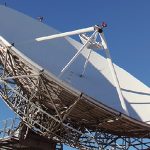The report investigates the history and current status of the sector through interviews with the senior executives
 The World Teleport Association (WTA) has released LEO/MEO Constellations and the Teleport, a new research report that shares insights from teleport, satellite and technology executives on their experience so far with non-GEO services, the potential of the constellations to change both the market and their businesses, and the steps they are taking for the future.
The World Teleport Association (WTA) has released LEO/MEO Constellations and the Teleport, a new research report that shares insights from teleport, satellite and technology executives on their experience so far with non-GEO services, the potential of the constellations to change both the market and their businesses, and the steps they are taking for the future.
The next eighteen months are critical for the first attempt since Iridium to loft a large-scale constellation of low-earth-orbit satellites that promise to transform global communications.
In LEO/MEO Constellations and the Teleport, WTA investigates through interviews with the senior executives of large and small teleport operators, technology experts and operators of LEO, MEO and GEO fleets.
OneWeb is the leader of the pack of LEO constellations seeking to deliver low-priced, low-latency connectivity everywhere and its success could have major market impacts for GEO satellite operators and teleport operators.
Already, LEO operators are in serious deal-making mode with operators of ground segment to provide the gateways they need to manage and provide access to their constellations.
At a moment when most of that impact is still to come, we seek answers from LEO constellations in development, GEO operators, teleport operators and the examples of Iridium, Globalstar and Thuraya integration into the business model of teleport operators.
Commenting on the report, Executive Director and report editor Robert Bell, said: Every teleport operator we interviewed is actively engaged with at least one non-GEO operator. Some are at the discussion stage while others are doing revenue-generating business today. The opportunities range from being a landlord that offers colocation, to providing technology services and field installation and serving as channel partners bringing revenue to the constellation operators.
















































































